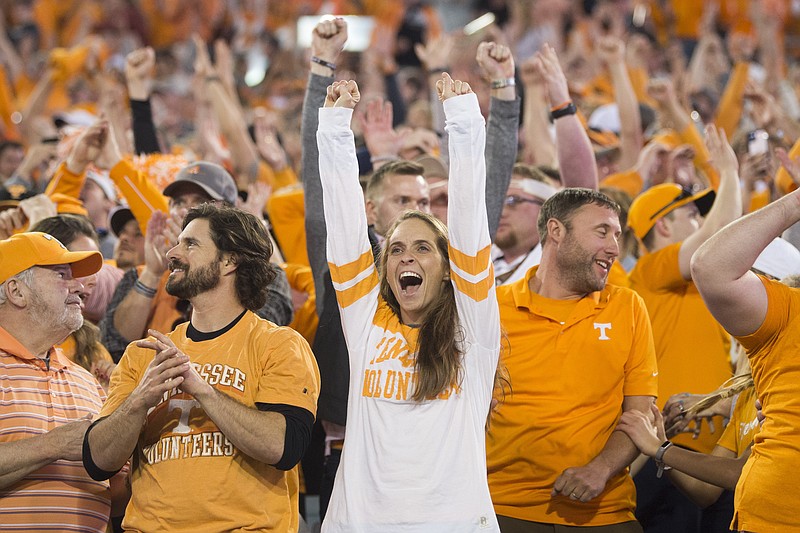Exactly 30 days ago today, Alabama coach Nick Saban said of college football's changing priorities: "We have made everything about the playoffs in college football."
It's hard to have viewed all those empty seats at numerous bowl games the past three weeks and not overwhelmingly agree with Saban's words. For a lot of us, perhaps most of us, the bowls have become almost as meaningless as any other nonconference football game that doesn't include a couple of top-10 teams, which is pretty much what most bowls are these days.
That is, that's how we view them unless our personal favorite college team is involved. Then you witness scenes like last Thursday's TaxSlayer Gator Bowl in Jacksonville, where it seemed as if half the Volunteer State had migrated to Florida to watch the Tennessee Volunteers attempt to win a sixth straight game.
Think beating Big Ten foe Indiana didn't matter to 40,000 or so Volniacs? Think thousands of Hoosiers didn't equally care, the two sides all but filling up the 68,000-seat TIAA Bank Field? What was it UT coach Jeremy Pruitt said of those fans after the Big Orange's stirring 23-22 comeback win? Something about, "Our fan base - all the orange was there when the clock struck zero that was there when the game started, and we can't say enough about our fan support and what they mean to everybody associated with this organization"?
That's one very big reason that Tennessee football, along with the other 13 teams in the Southeastern Conference, are so coveted, because they almost never are meaningless to the fans of SEC schools.
But it's not just the fans. Let us return to the end of Kentucky's 37-30 victory over Virginia Tech at the Belk Bowl in Charlotte. Look closely and you'll see No. 17 for the Cats, reserve quarterback Walker Wood, standing on the lip of the stands as he leads the fans in cheers.
Why is this significant? Wood put his name in the transfer portal a few weeks ago. He almost assuredly will be playing elsewhere next season, yet he was the biggest cheerleader out there for Big Blue in Charlotte.
It is certainly arguable that there are too many bowls, something like 40 in all now if you include next Monday night's College Football Playoff title game. With only 130 schools currently fielding Football Bowl Subdivision teams, it's almost as if the youth soccer trophy mentality has trickled up to major college football. Or as my daughter Julia Caroline asked when a logo for the "Great Idaho Potato Bowl" flashed across our television screen one night, "What's great about it?"
"Nothing really," I replied, "but it certainly sounds better than the Mediocre Idaho Potato Bowl, doesn't it?"
Of course, if you were the Ohio Bobcats and you'd just beaten Nevada 30-21 to win this year's Great Idaho Potato Bowl on the blue plastic field of Boise State's Albertsons Stadium, you probably couldn't imagine anything greater.
For coaches such as UT's Pruitt, the worth of most of these bowls is in both the preparation and the motivation. If all we had was a playoff, most teams' seasons would be done by the middle of October, if not sooner. Bowls are the proverbial carrot to dangle in front of a bunch of young adult males to keep them focused on working hard and improving.
Beyond that, it's 15 extra practices for coaches, and when you're Pruitt and you're losing a fairly large number of talented seniors, those practices can make a huge difference for next season.
To return to Saban's quote, it was said, at least in part, because a number of high-profile seniors or draft-eligible juniors in recent years have chosen to sit out bowl games rather than risk injuries. If their team wasn't chosen for the playoff, they were done.
In some ways you can't blame them, especially since every financial situation is different. But it's football, and if you're worried about getting hurt in a somewhat meaningless game, you can't play the sport, because there are a lot of NFL games that are somewhat meaningless over the final five or six weeks of any pro season.
But those players seemed fewer this season. Merely consider Kentucky quarterback Lynn Bowden, who announced in December that he would forgo his senior season but would play in the Belk Bowl. For a guy who was about to be hit by an aggressive Virginia Tech defense on every snap, that decision could have been criticized. Bowden's speed and quickness are his ticket to a better life. One knee injury could end all that.
Instead, he not only played, he played the whole game like a madman, running for 233 yards, the most yards ever by an FBS quarterback in a bowl.
Said UK center Drake Jackson after the game: "For a guy who is leaving early (to turn pro) and decided to play in the bowl; then, to decide to play hard in the game, you really have to give him a lot of credit."
In other words, don't try telling so many of those who play and play hard in these bowl games that only the playoff matters.
Or as Tennessee freshman Eric Gray, who was the TaxSlayer Gator Bowl MVP, said of his first bowl experience: "For me, being a Tennessee boy and being here at Tennessee, it's been unbelievable. It's been an unbelievable journey. It's something I dreamed about as a kid, playing college football, playing in a bowl game."
As long as many more players than not feel that way, the future of college football will be just fine.
Contact Mark Wiedmer at mwiedmer@timesfreepress.com.

